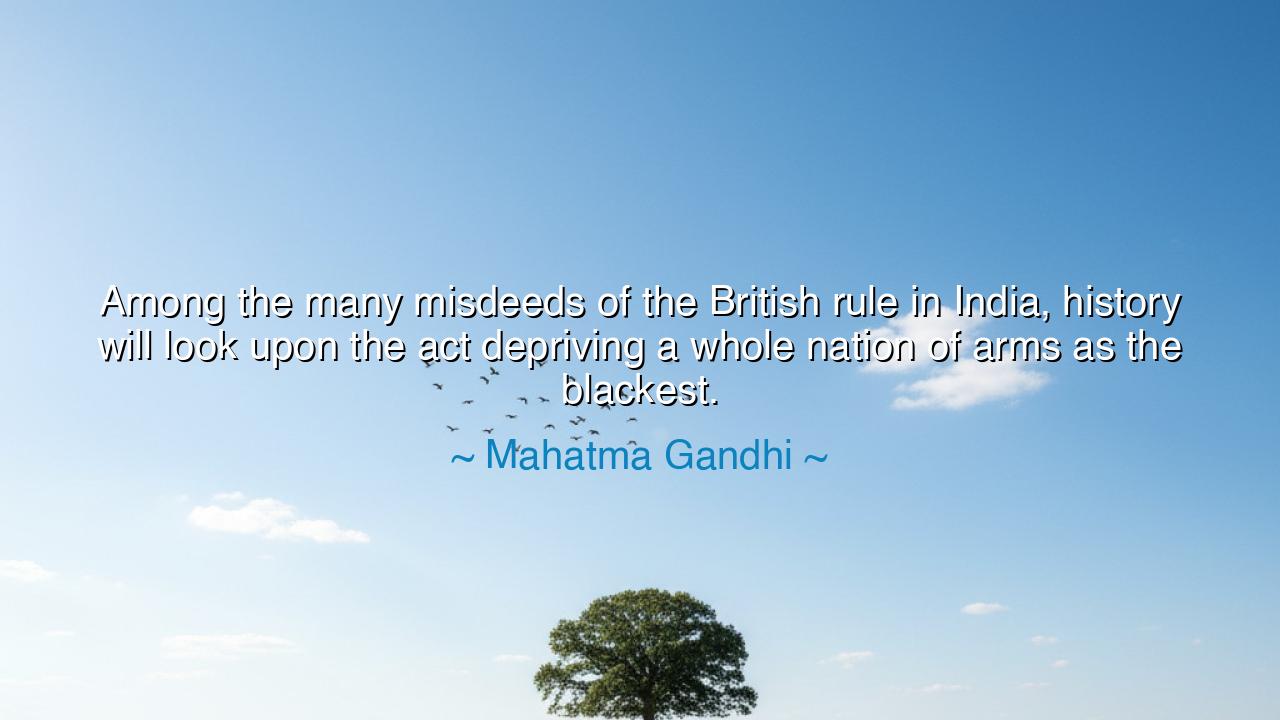
Among the many misdeeds of the British rule in India, history
Among the many misdeeds of the British rule in India, history will look upon the act depriving a whole nation of arms as the blackest.






When Mahatma Gandhi declared, “Among the many misdeeds of the British rule in India, history will look upon the act depriving a whole nation of arms as the blackest,” he was not merely lamenting a political injustice — he was unveiling a profound truth about freedom, dignity, and the human spirit. His words, spoken in the early years of India’s struggle against colonial domination, echoed like thunder through the silence of submission. To Gandhi, the disarmament of India was not simply the confiscation of weapons; it was the crippling of courage, the deliberate extinguishing of a people’s will to stand upright and defend their honor.
To understand the weight of this saying, one must look to the history of British rule in India. When the British arrived, they came as traders; when they stayed, they ruled as conquerors. After crushing the great uprising of 1857 — the First War of Independence, when Indian soldiers and civilians rose in furious unity — the British feared the spirit of rebellion that burned in the hearts of their subjects. To prevent such fire from ever rekindling, they passed laws that disarmed the Indian people, stripping them of the right to bear arms. What they took was not merely the sword or the musket — they took away agency, the visible symbol of resistance, the physical embodiment of self-reliance. Gandhi saw this not only as a political act, but as a moral sin, for it rendered the people helpless before their rulers, dependent upon the very power that oppressed them.
And yet, Gandhi’s vision was not one of vengeance. He was a man who believed that the truest weapon was not forged of iron but of truth and conscience. When he condemned the disarmament of India, he was not calling his people to violence; rather, he was revealing the deeper significance of self-defense — that the capacity to protect oneself, physically or spiritually, is essential to self-respect. A nation deprived of its means of defense, he warned, becomes a nation deprived of its soul. For a people who cannot resist injustice are like a body without bones — shapeless, vulnerable, and easily bent.
Consider, for example, the story of the Salt March of 1930, when Gandhi led thousands of Indians to the sea to make their own salt in defiance of British law. The British had not only taxed the basic necessities of life but had monopolized them, as they had once monopolized arms. The marchers carried no weapons; yet, as they walked hundreds of miles under the burning sun, their discipline became their shield, and their unity their sword. The empire’s soldiers struck them down with batons, but the people did not retreat. In that moment, Gandhi’s vision became clear — though they had been disarmed, they were no longer powerless. They had recovered a higher form of strength: the moral weapon of nonviolent resistance, born not from fear, but from faith.
Thus, the quote carries a paradox both tragic and transcendent. Gandhi recognized that the British had physically disarmed India, but through nonviolence, he sought to rearm her spirit. To deprive a nation of arms was to deprive it of the ability to choose its destiny — yet to reclaim that freedom did not require muskets, but moral awakening. His words remind us that every act of domination begins by stripping people of their power — whether through weapons, education, or voice — and that the path to liberation begins by reclaiming that power within.
On a deeper level, Gandhi’s condemnation of disarmament was also a warning to all future generations. He saw that when rulers fear their people, they seek to make them dependent — to weaken them through comfort, division, or disempowerment. And when people forget their strength, when they surrender their capacity to act, they become easy prey for tyranny. Gandhi’s cry was therefore not only for India, but for all humanity: Do not give away your right to resist, to think, to protect what is sacred. For the greatest chains are not those that bind the hands, but those that bind the mind.
So, O seeker of truth, take this lesson to heart. To live in freedom is not merely to be unchained; it is to possess the courage, wisdom, and will to defend what is right. Whether by sword or by spirit, each soul must be ready to stand for justice. Guard your conscience as you would your homeland; nurture strength, but temper it with mercy. For a nation’s greatness lies not in conquest, but in its people’s power to say no to oppression, and yes to truth.
In the end, Gandhi’s words resound through the corridors of time as both a lament and a call to action. “Among the many misdeeds of British rule…” he said — but his message is eternal: that no empire, no power, and no tyranny can long endure against a people who have armed their hearts with courage, their minds with knowledge, and their spirits with righteousness. To deprive a nation of such power is indeed the blackest of deeds — but to awaken it once more is the brightest triumph of all.






AAdministratorAdministrator
Welcome, honored guests. Please leave a comment, we will respond soon